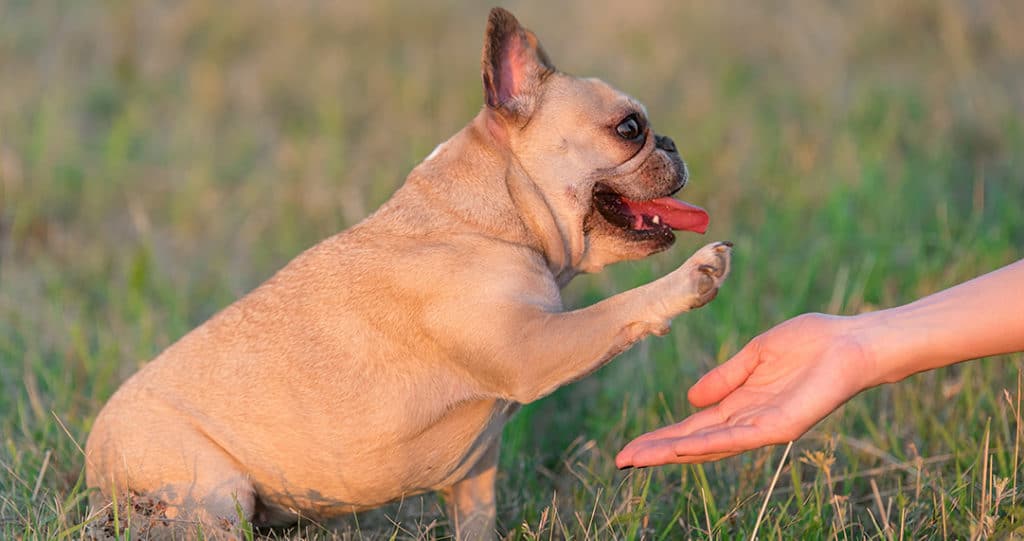
The French Bulldog is a happy little bundle of joy, and joy is what they tend to bring.
Now, they can be a bit stubborn, so you need to account for that when training them, ha! But it’s a part of their charm really.
They are certainly not difficult to train, they just need consistency and attention.
Are French Bulldogs hard to train? French Bulldogs fall in around the average dog for training due to a stubborn streak some possess. They are a very clean breed that tends to like things tidy, which usually makes potty training easier. For general training, they fall somewhere in the middle of the spectrum, and a competent dog trainer should be able to overcome their stubborn nature with patience and consistency.
Read on as we will cover some of the more common training issues that occur in this breed.
With any of these subjects, bear in mind that your dog may not have these problems.
All breeds will have a certain amount of individual variation in terms of behavior. The traits discussed here are general trends but not absolute rules.
Raising and training a Frenchie can be frustrating, especially if you’re employing the trial-and-error approach.
Frustration doesn’t have to be part of the equation, though – not if you have a guidebook to steer you in right direction and help you avoid common mistakes.
The Owner’s Guide To The Perfect French Bulldog provides you with an honest look at the breed and is packed with practical advice and expert tips specific to Frenchies.
No more wasting time or wondering if you’re doing things the right way!
You’ll learn all about breeder and puppy selection, puppy proofing, training, necessary gear, health concerns, exercise and socialization, mental health, and so much more!
If you’re considering adding a Frenchie to your family or recently brought home a little bundle of joy, this book is an absolute must-have.
Get your copy today, and you’ll be well on your way to confidently raising the dog of your dreams.
Potty Training Your French Bulldog
Steady! The key here as always is consistency. Fortunately, the Frenchie likes to keep things tidy and will generally avoid accidents naturally if given the opportunity.
They are also very intelligent dogs, so you will be able to communicate with them easily.
Now, if you find yourself with a stubborn one… well, just a bit more patience will be required! You’ll get it!
Remember that as a smaller breed and especially as a puppy, they have small bladders and a limited amount of time they can hold it.
So you’ll want to set a schedule, and take them out often.
Many owners find that crate training significantly reduces the time spent housebreaking. Learn what features to look for and see which crate we recommend here.
How Long Can They Hold It?
A general rule of thumb by the ASPCA is puppies can hold it for roughly their age in months +1 hour.
So a 3-month-old pup can hold it around 4 hours. When we first got our dog Chachi he was almost 3 months old.
We took him out every couple of hours those first few days.
But he was able to hold it overnight for the most part, and when he wasn’t, he went on the puppy pads we put in his pen.
Gotta Go Signs!
Watch your French Bulldog for signs they need to go. These can include pacing the room, whining, barking, or even staring at you.
Chachi would eventually learn that the back door is the place to go. This came with consistency.
Some people like to associate a bark with having to go outside. This is a good option because even if you’re not in eyesight of them, you’re still alerted they need to potty.
We’d recommend you do the same thing as often as possible. Pure repetition and consistency will set the behavior.
Many use the phrase “let’s go outside” for when it’s time to go. Take them all the way to the spot you want them to go potty. Set them down and say “go potty.”
Celebrate when they get it right with a “Good boy!” or “Good girl!” “You’re the best dog ever!” I tend to follow up with incoherent baby talk. I can’t help it.
To make pottying outside even more high-value, you can give them a treat once they do their business.
Just make sure that the treat is something relatively healthy and that they actually like it.
These all-natural treats, for example, are perfect as they are made with wholesome ingredients, come in three different flavors and are just the right size to offer as a reward when training.
Patience and Understanding
Don’t punish your dog for an accident they had in the house, especially if time has passed since the accident–they won’t be able to associate it with the actual behavior.
If you catch them in the act, a hand clap and a “no” followed by taking them outside to their spot is what we recommend.
[mv_video doNotAutoplayNorOptimizePlacement=”false” doNotOptimizePlacement=”false” jsonLd=”true” key=”wfd2imrmult4k28r1ljv” ratio=”16:9″ thumbnail=”https://mediavine-res.cloudinary.com/v1607185216/p009j6gjagpz9gefbvez.jpg” title=”Meet 6 Adorable French Bulldogs” volume=”70″]How Do French Bulldogs Rank On A Trainability Scale?
There is no official “dog trainability scale,” but there is something that should be called as such.
Tests of intelligence are performed on dogs of all breeds, and these tests are mostly conducted by testing the dogs’ ability to respond to commands.
Because an intelligent dog might not always be an obedient dog, canine intelligence tests are really just tests of their trainability.
When we look at this scale, we can see that the French Bulldog is classified as “fair.”
This classification seems to fit with the general opinion of most French Bulldog owners. They can be trained to do many things, but they require a little more patience.
A stubborn nature is a trait that the Frenchie inherited from its larger and more aggressive ancestors.
Although the French Bulldog is obviously a member of the Bulldog family, it is not a working dog.
Working dogs tend to be much more trainable because that helps them to do their jobs. In terms of their function, Frenchies could be described as a toy breed.
As we can see from the research, toy breeds are not the most trainable of dogs.
This 149-page ebook is the ultimate owner’s guide for the breed – packed with tips, tricks, and answers to the most popular and frequently asked questions. Avoid the frustration, lost time, and wasted money that comes with not knowing how to properly and easily care for your Frenchie.
Are Frenchies Known To Be Stubborn?
Yes, Bulldogs of any type are notoriously stubborn.
Although French Bulldogs have many endearing qualities (not least of which is their willingness to defend their owners), they are also hard-headed.
This problem tends to get much worse when a Frenchie is particularly excited, so bear this in mind when choosing the right time to drill commands.
Are Frenchies Intelligent And Eager To Please Their Owners?
The good news about the French Bulldog’s stubborn nature is the fact that they are highly intelligent and highly devoted to their masters.
These are also typical Bulldog traits, and they serve as a natural counterbalance to the rowdy nature of these breeds.
This is why a trainer can learn to get past their stubborn nature and make obedient dogs of them.
Be sure to check out all of our French Bulldog articles for helpful tips and answers to your questions. Click here to see them all.
What Things Should You Teach Them First?
You need to teach them a set of commands, one at a time. You need to run them through those commands every day as part of a set routine.
After a while, you probably won’t need to do it every day. You will need to reward them every time they perform as expected.
Once the dog settles into the routine and learns what is expected of them, you can start doing the routine every other day.
The fundamental of this training method is to prompt your dog with a word you are trying to train. “Sit” for example.
- Have a treat ready, let them know you have it.
- Next, hold it out of reach. Say “Sit” and wait.
- If he jumps up for it, calmly say “no”. If he sits, immediately reward him with the treat and praise. It will take a bit of time, but he’ll get it!
Your goal here is to get the behavior, and immediately reward. Catching that time of her sitting and the reward is the key to making the connection.
Basic Commands: A basic routine should consist of the following commands:
- “Come”
- “Sit”
- “Stay”
- “Heel”
- “Up/Down”
- “Shake”
Think of this as the foundation of your dog’s training.
Once these basic commands have been mastered, you can move on to more complex tasks or specialized training if you are inclined to do so.
As we already mentioned, they are stubborn, so make sure that you are patient with them.
Never get angry and start screaming at them or hitting them.
This will completely ruin the training, as it will only confuse a dog who already doesn’t understand what you are doing in the first place.
You may need to raise your voice if the dog disobeys, or maybe even give them a small tap on the head to remind them who is the boss.
However, all of this must be tightly controlled. You must remember that you are the pack leader and that you are in control at all times.
Obedience Training
If you are dealing with a very difficult case, you may consider hiring the services of a professional obedience trainer.
This is probably the most expensive way to get the job done, but it is also the easiest.
At the same time, make sure you trust the trainer completely before you put a fragile little dog into their hands.
Never trust a trainer without inspecting the work that they have done in the past.
Make sure you go to their kennel area and look around to see the conditions in which the dogs will be staying.
Also, if your dog has any kind of health issues, you should probably avoid this route.
Few obedience trainers will be truly prepared to deal with a health emergency, should one arise.
How Often Should A French Bulldog Be Trained?
Mostly, this will depend on how far along you are in the training process. In the beginning, you will need to work with your dog every day.
Twice a day is ideal (one session in the morning and one in the evening), but most people don’t have time for that.
Once a day should be good enough for all but the most extreme cases.
As the dog begins to obey more quickly and to understand a wider range of commands, you can move on to a less-demanding schedule.
Once a good set of habits has been established, it will be easier to maintain them than it was to establish them. However, there is not a cutoff point.
There will never be a time when you no longer have to worry about training your dog.
Any training that is not maintained will be lost, so you’ll need to work with them at least once a week, even after they have mastered everything that you want them to learn.
The Importance Of Consistency
Because of their behavior patterns, a Frenchie isn’t going to learn from one or a few repetitions, no matter how simple the command.
They need consistent, repetitive training, and that is usually called drilling. The idea is to make them do it until it becomes second nature.
This is where you, the trainer, need to have the patience to keep going.
Dogs do not understand many of the complex concepts that humans deal with on an everyday basis. As such, you have to keep it very simple for them.
They may not be able to read your mind, but they can engage in pattern recognition. Thus, they can learn that a certain type of behavior brings reward.
However, they can only learn in this way if you do not confuse them by sending mixed signals. Commands and expectations should be exactly alike, every time they are given.
Related Questions:
What are 3 basic commands to teach your Frenchie?
This is largely a matter of personal preference. However, it’s a good idea to start with:
- “Sit”
- “Stay”
- “Come”
These three commands focus on controlling your dog’s basic movement and calming them down when they get too excited to listen.
Chances are, a dog that is being trained for the first time is going to be a puppy, and puppies are always full of energy.
That excess energy is the first obstacle that you must overcome in order to train the dog.
Make sure your pup has already had plenty of physical activity for the day before attempting a training session. How much is enough? Find out here.
What is a good homemade treat to use for dog training?
There are many possibilities, so you should probably focus more on the things that you shouldn’t give your dog.
A treat can be anything that your dog likes, as long as it isn’t unsafe.
In this article, we go over several healthy options and provide a list of what not to share with your Frenchie.
Meat grease with a little bit of flour or brown rice added to it can be cooked down, rolled into little balls, and dried out to make a healthy and delicious treat.
Just make sure they aren’t allergic to any of the ingredients.
We Hope You Enjoyed!
In closing, we should remind you that dog training is never easy.
Although this breed might require a little more time and effort to train, it doesn’t have to be an overly difficult process.
Your little knucklehead just needs a competent leader to steer them in the right direction, and it can be fun to play this role.
If you look at dog training as a chore, then a chore is just what you will have. Instead, look at it as a game that you play with the dog and an incredible bonding opportunity.
This will keep things light and enjoyable for both you and your Frenchie.
Remember that you don’t have to undertake everything on your own.
Our book, The Owner’s Guide To The Perfect French Bulldog will be there for you every step of the way.
It is the only Frenchie guide you’ll need – the one you turn to again and again.
Last update on 2024-04-25 at 02:08 / Affiliate links / Images from Amazon Product Advertising API







